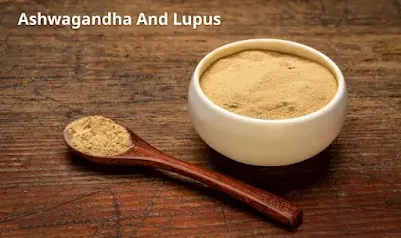In this article, we will explore the uses, potential side effects, and recommended doses of ashwagandha, focusing on its potential benefits for those suffering from lupus, an autoimmune disease. Our journey is illuminated by the beacon of current scientific evidence. Get ready to unlock the power of ashwagandha and understand its role in optimal health and wellness.
 |
| Ashwagandha And Lupus |
What is Lupus?
Traversing the landscape of autoimmune diseases, we stumble upon lupus systemic lupus erythematosus, a complex and multifaceted condition renowned for its unpredictability. Known scientifically as Systemic Lupus Erythematosus (SLE), it is an autoimmune condition where the body's immune system mistakenly wages war against its own cells. This internal battle royale results in widespread inflammation and tissue damage, leading to a variety of lupus symptoms.Owing to its chameleon-like nature, Lupus can mimic other autoimmune conditions such as Rheumatoid Arthritis and Undifferentiated Connective Tissue Disease making a differential diagnosis challenging. This shape-shifting disease can affect various body systems, including your joints, skin, kidneys, blood cells, brain, heart, and lungs.
While the precise cause remains as elusive as a disappearing magician, certain factors such as genetics, environment, and hormones are believed to play a key role in triggering this autoimmune disorder.
Understanding Ashwagandha: History, Uses, and Effectiveness
Known as the "Prince of Herbs" in Ayurvedic medicine, the ashwagandha root has a rich history as a potent medicinal herb. Originating from the lush landscapes of India, this adaptogenic treasure, scientifically known as Withania somnifera, has been employed to ward off a myriad of health conditions for centuries.Today, the ashwagandha root extract is renown for its diverse uses. It is hailed for its ability to manage chronic stress, elevate cognitive function, and boost immune activity. Its benefits extend to improving sleep quality and enhancing overall well-being.
Research studies have begun to unveil the curtain on the effectiveness of ashwagandha supplements. Preliminary findings suggest promising benefits, from stress resilience to protection against neurodegenerative diseases, indicating a bright future for ashwagandha use in modern medicine.
Read also: How does ashwagandha make you feel?
Research suggests that ashwagandha withania somnifera extract, may help in regulating autoimmune disorders by modulating the body's immune response and reducing the activity of pro-inflammatory cytokines, proteins that play a critical role in autoimmune flare-ups. This could potentially benefit lupus patients who often suffer from an overactive immune system attacking their own body.
However, it's imperative to note that while ashwagandha shows promise, it's no substitute for conventional lupus treatment. As always, it's advised to consult with a health professional before incorporating any new supplements into your routine, especially for those already on certain medications for lupus.
Ashwagandha and Lupus: A Closer Look
The intriguing connection between the adaptogenic herb ashwagandha and lupus, an autoimmune disorder, has recently gained attention in the healthcare sphere. Studies have shown the potential benefits of ashwagandha extract in managing lupus symptoms, with a focus on its influence on disease activity and immune function.Research suggests that ashwagandha withania somnifera extract, may help in regulating autoimmune disorders by modulating the body's immune response and reducing the activity of pro-inflammatory cytokines, proteins that play a critical role in autoimmune flare-ups. This could potentially benefit lupus patients who often suffer from an overactive immune system attacking their own body.
However, it's imperative to note that while ashwagandha shows promise, it's no substitute for conventional lupus treatment. As always, it's advised to consult with a health professional before incorporating any new supplements into your routine, especially for those already on certain medications for lupus.
.webp) |
| Ashwagandha And Lupus |
Complementary Approaches: Integrative Treatment for Lupus
Traditional lupus treatments often come with a series of challenges, from high levels of oxidative stress to fluctuations in blood pressure. Yet, the world of functional medicine offers innovative, integrative approaches that can work in conjunction with conventional treatments.One such approach is the use of ashwagandha. Studies indicate that this ancient herb may have anticancer effects and the potential to manage lupus symptoms by regulating thyroid hormone levels and reducing stress levels. However, as with all treatments, safety and precautions must be taken into account.
- Therapeutic diet: Nutrition plays a crucial role in managing lupus. A diet rich in antioxidants can help lower blood pressure and control blood sugar levels.
- Supplements: Alongside ashwagandha, other supplements may also have a positive impact on lupus cases.
- Acupuncture: This ancient practice has shown promise in reducing SLE symptoms and improving overall health.
Conclusion
Ashwagandha for Lupus
After exploring the traditional and modern uses of Ashwagandha, it's clear that this powerful adaptogen holds great potential for improving human health in many ways. Specifically, for those battling Lupus, incorporating Ashwagandha into their lifestyle modifications might offer some benefits.However, it's crucial to remember that Ashwagandha, like all medicinal herbs, comes with its own set of advantages and disadvantages. Potential interactions with drugs, such as blood pressure reducers, thyroid hormone medications, and diabetes medications, emphasize the need for cautious use.
Before making any changes to your health regimen, especially when dealing with complex diseases like Lupus, always consult a healthcare professional. Understanding the potential risks and dosing requirements of Ashwagandha is key to safely reaping its perks.
As the pursuit for natural health solutions continues, the prominence of Ashwagandha is likely to grow. So, why not explore this ancient herb and its potential to enhance your well-being?

